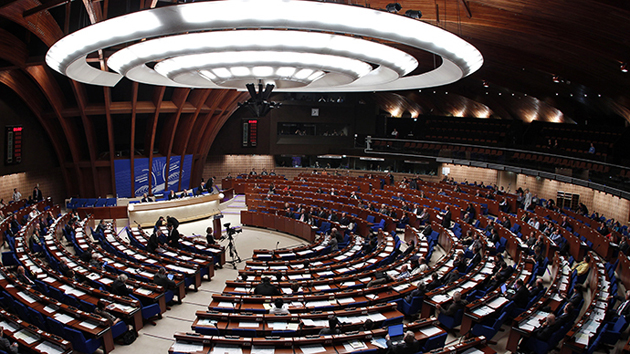Council of Europe will vote a resolution asking European governments to “tackle intolerance in Europe with a special focus on Christians”. Evangelicals hope this will protect faith communities in countries in which they are marginalized.
 General view of the CoE Parliamentary Assembly. / CoE
General view of the CoE Parliamentary Assembly. / CoE
Fourty-seven European countries could agree next week to better protect religious freedom in Europe. It would happen if a report driven by Moldovan MP Valeriu Ghiletchi is passed by the Parliamentary Assembly of the Council of Europe (CoE).
“Governments ignoring or even encouraging religious intolerance damages freedom of religion and threatens social cohesion”, told European Evangelical Alliance sociopolitical representative Julia Doxat-Purser to Evangelical Focus.
“TACKLING INTOLERANCE IN EUROPE”
Political representatives (MPs) from all over Europe are called next week (26th to 30th January) to attend the parliamentary debate of the CoE. New initiatives to promote Human Rights in the continent will be on the table.
One of the so-called “reports” on the agenda is one introduced by Moldovan MP Valeriu Ghiletchi. After receiving the approval of the CoE Committee on Equality and Non-Discrimination, Ghiletchi will ask all attendees to the Strasbourg assembly to vote in favour of the proposition: “Tackling intolerance in Europe with a special focus on Christians”.
“Numerous acts of hostility, violence and vandalism have been recorded in recent years against Christians and their places of worship”, warns Giletchi’s report.
The text recommends “measures to ensure the effective enjoyment of the protection of freedom of religion or belief afforded to every individual in Europe”.
Ghiletchi and the committee will ask other MPs to adopt a text which prompts European governments to “promote a culture of tolerance and 'living together' based on the acceptance of religious pluralism, protect the peaceful exercise of freedom of assembly, uphold the fundamental right to freedom of expression and publicly condemn the use of and incitement to violence”.
DOXAT-PURSER: ‘RESOLUTION COULD URGE GOVERNMENTS TO ACT’
The European Evangelical Alliance has shown support to the resolution and its sociopolitical representative Julia Doxat-Purser talked to Evangelical Focus about the importance of this voting.
 Julia Doxat-Purser.
Julia Doxat-Purser. Question. The report mentions “Numerous acts of hostility, violence and vandalism [that] have been recorded in recent years against Christians and their places of worship”. One could think these type of aggressions to religious liberty would have disappeared in Europe long ago. Why is there a need for a report like this one to be accepted?
Answer. Intolerance against Christians, and indeed followers of other faiths, is growing across Europe. Too often, governments don’t act. It’s as if they hope the problem will go away or that it is too difficult to resolve. But Europe’s nations are made up of people of many faiths and worldviews. We have to work harder to promote a civil public square where people can be themselves and live according to their beliefs, while respecting the freedom of conscience of others. Governments ignoring or even encouraging religious intolerance damages freedom of religion and threatens social cohesion.
Q. Do you trust the CoE Parliamentary Assembly will pass the resolution? What can Christians do to help this report come through next week?
A. We are thrilled that the resolution passed unanimously through committee stage. However, plenary votes depend entirely on the politicians who bother to go to Strasbourg to vote. A few national parliamentarians from all 47 member states of the Council of Europe have the right to vote but most do not bother.
The most important thing Christians can do to help is to pray. Also, if they know that some of their national delegation are likely to be concerned about religious freedom, they can write a short, positive note to the individuals and encourage them to attend the plenary session and vote for the Ghiletchi resolution. [Find your national representatives at the CoE Assambly here]
Q. Can the actions and values proposed in this report be useful to defend religious freedom within Europe?
A. Yes. The resolution calls on member states to “promote a culture of tolerance and “living together” based on the acceptance of religious pluralism, on the contribution of religions to a democratic and pluralist society but also on the rights of individuals not to adhere to any religion;” and to promote “reasonable accommodation” as a way of handling freedom of conscience clashes. If the resolution is accepted, across Europe we can use this call to encourage governments, the media and employers to act more responsibly, to intervene when rights are denied and also to work towards a cultural and legal context where there is less intolerance and freedom of conscience restrictions.

Las opiniones vertidas por nuestros colaboradores se realizan a nivel personal, pudiendo coincidir o no con la postura de la dirección de Protestante Digital.
Si quieres comentar o